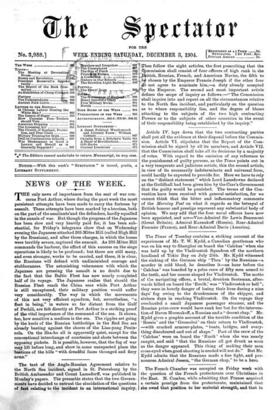The Times of Tuesday contains a striking account of the
experiences of Mr. T. W. Kydd, a Canadian gentleman who was on his way to Shanghai on board the Calcha,s ' when she was held up by the Vladivostok Squadron off the northern headland of Tokio Bay on July 25th. Mr. Kydd witnessed the sinking of the German ship ' Thee ' by the Russians—a murder in cold blood, he describes it—an hour before the Calchas ' was boarded by a prize crew of fifty men armed to the teeth, and her course shaped for Vladivostok. The motto of the navigating officer, a brutal, drunken Scotsman, after- wards killed on board the Rurik,' was "Vladivostok or hell"; they were in hourly danger of losing their lives during a nine days' fog owing to the drunkenness of the skipper, and sixteen days in reaching Vladivostok. On the voyage they overhauled a small Japanese passenger steamer, and the Russian prize-crew would have sunk her but for the interven- tion of Baron Hormakoff, a Russian and a "decent chap." Mr. Kydd gives a graphic account of the terrible condition of the Rossia.' and the Gromoboi' on their return to Vladivostok, —with cracked armour-plates, "boats, bridges, and every- thing discoloured and out of shape." Part of the crew of the Calchas ' were on board the Rurik ' when she was nearly caught, and said "that the Russians all got drunk as soon as the danger appeared. This thing of making their men cross-eyed when good shooting is needed will not do." But Mr. Kydd admits that the Russians made a fine fight, and pro- nounces Admiral Jessen, "the German chap," to be a hero.
The French Chamber was occupied on Friday week with the question of the French protectorate over Christians in the East. M. Combes, while admitting that France acquired a certain prestige from the protectorate, maintained that she owed that position to her material strength, and that in






































































 Previous page
Previous page